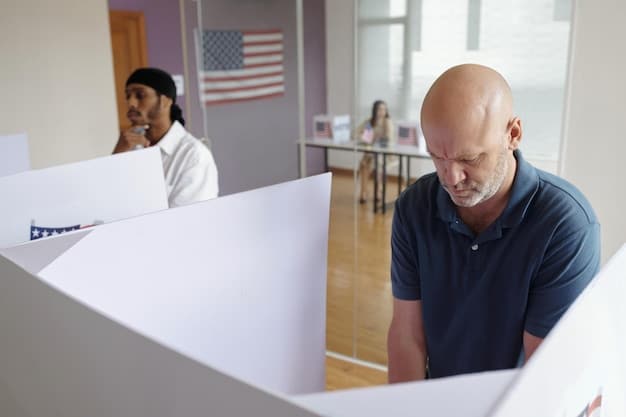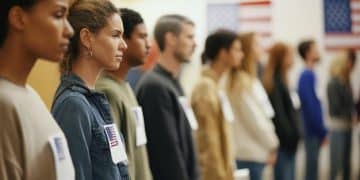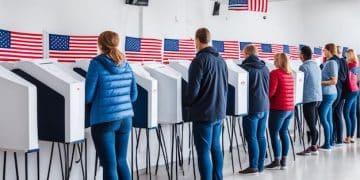Protecting Your Voting Rights: A 2025 Guide to Fighting Voter Suppression

Protecting your voting rights in 2025 requires understanding voter suppression tactics and knowing how to respond, including verifying registration, understanding voting laws, reporting irregularities, and seeking legal assistance to ensure every vote is counted.
As we approach the 2025 elections, understanding how to safeguard your right to vote is crucial. This guide provides essential information on protecting your voting rights: What to do if you face voter suppression tactics in 2025, ensuring your voice is heard.
Understanding Voter Suppression Tactics
Voter suppression encompasses a range of tactics designed to prevent eligible voters from casting their ballots. Recognizing these methods is the first step in protecting your voting rights.
These tactics can vary widely, from strict voter ID laws to the reduction of polling places, making it more difficult for certain demographics to vote. Understanding these strategies is essential for countering them effectively in 2025.
Common Forms of Voter Suppression
Several specific tactics have been used to suppress voter turnout. Being aware of these can help you recognize and combat them.
- Strict Voter ID Laws: Requiring specific forms of photo identification that are not easily accessible to all citizens.
- Polling Place Closures: Reducing the number of polling locations, particularly in areas with high minority populations, leading to longer lines and reduced access.
- Voter Roll Purges: Removing eligible voters from registration lists based on inaccurate or discriminatory criteria.

The Impact on Different Communities
Voter suppression tactics disproportionately affect certain communities, making it harder for them to participate in elections. Understanding who is most vulnerable can guide efforts to protect voting rights.
Minority communities, low-income individuals, students, and people with disabilities often face greater obstacles to voting. These groups may lack the resources or information needed to navigate complex voting requirements.
In conclusion, recognizing voter suppression tactics and understanding their impact is essential for preparing to defend your voting rights in 2025. Awareness is the first line of defense against these insidious practices.
Verifying Your Voter Registration Status
Ensuring you are correctly registered to vote is fundamental. It’s a simple step that can prevent issues on Election Day and is key to protecting your voting rights.
Regularly checking your registration status helps you identify and correct any errors or discrepancies before they become a problem. This proactive approach ensures your eligibility to vote is not questioned.
How to Check Your Registration
Checking your voter registration is a straightforward process, and numerous resources are available to assist you.
- Online Voter Registration Check: Most states offer online tools where you can enter your information to verify your registration status.
- Contacting Your Local Election Office: Reach out to your county or city election office for assistance with verifying your registration.
- Using Third-Party Websites: Several non-partisan websites provide voter registration lookup services.
Correcting Errors or Updating Information
If you find an error in your registration or need to update your information, taking prompt action is crucial for protecting your voting rights.
Incorrect information can lead to challenges when you try to vote. Updating your address, name, or other details ensures a smooth voting experience.
For instance, contact your local election office immediately to correct any inaccuracies or submit an updated registration form. Be sure to have the necessary documentation, such as a driver’s license or proof of address.
In conclusion, verifying and maintaining your voter registration is a fundamental step in safeguarding your right to vote. By staying informed and proactive, you can avoid potential issues and ensure your voice is heard.
Understanding State Voting Laws for 2025
Understanding the specific voting laws in your state is crucial for navigating the electoral process in 2025. Laws can vary significantly, and knowing your rights helps in protecting your voting rights.
State laws govern everything from voter registration requirements to absentee voting rules and early voting options. Staying informed ensures you can vote confidently and without obstacles.
Key Aspects of State Voting Laws
Familiarize yourself with the key aspects of your state’s voting laws to ensure you are well-prepared for the 2025 elections.
- Voter ID Requirements: Know what forms of identification are accepted at polling places.
- Absentee Voting Rules: Understand the deadlines and requirements for requesting and submitting absentee ballots.
- Early Voting Options: Check if your state offers early voting and what the hours and locations are.
Resources for Staying Informed
Numerous resources are available to help you stay informed about your state’s voting laws and any changes that may occur before 2025.
Websites like the National Conference of State Legislatures (NCSL) and the U.S. Election Assistance Commission (EAC) provide comprehensive information. Local election offices and advocacy groups also offer valuable insights.

By staying informed about changes and utilizing available resources, you can confidently navigate the electoral process and help protect your voting rights. Knowledge is power when it comes to participating in elections.
What to Do If Challenged at the Polls
Being challenged at the polls can be a stressful experience, but knowing how to respond can help you assert your rights. Understanding what to do when challenged is key to protecting your voting rights.
It’s essential to remain calm, understand your rights, and document any irregularities. Preparedness can make a significant difference in ensuring your vote is counted.
Reasons for Challenges and Your Rights
Voter challenges can occur for various reasons, but you have specific rights that protect your ability to vote. Knowing these can help you navigate the situation effectively.
Challenges often arise due to questions about identity, registration, or eligibility. In such cases, you have the right to provide evidence to support your eligibility, such as confirming your address or showing identification.
For instance, if your name is not on the voter roll, you may be able to cast a provisional ballot, which will be counted after your eligibility is verified. Understanding these procedures is essential.
Documenting and Reporting Irregularities
Documenting any irregularities or challenges you face at the polls is crucial for addressing potential voter suppression efforts and protecting your voting rights.
Keep a record of the date, time, location, and details of the incident. Note the names and contact information of any witnesses. This information can be invaluable when reporting issues to election officials or legal organizations.
Contact your local election office or a voter protection hotline to report any irregularities. Organizations like the ACLU and the League of Women Voters also offer assistance and resources for reporting voter suppression.
In conclusion, knowing your rights and how to respond when challenged at the polls is crucial for safeguarding your ability to vote. Documenting and reporting irregularities helps ensure fair elections.
Reporting Voter Suppression and Seeking Assistance
If you witness or experience voter suppression, reporting it is vital for upholding the integrity of the electoral process and protecting your voting rights. Knowing where to turn for assistance is equally important.
Reporting incidents helps expose and address systemic issues, ensuring that all eligible voters have the opportunity to participate in elections without facing undue obstacles.
Who to Contact When You See Something
Several organizations and agencies are dedicated to addressing voter suppression and ensuring fair elections. Knowing who to contact can lead to effective action.
- Local Election Officials: Report any issues directly to your county or city election office.
- State Election Boards: Contact your state’s election board for assistance with resolving complex issues.
- Non-Partisan Organizations: Organizations like the Lawyers’ Committee for Civil Rights Under Law and the NAACP offer legal support and advocacy.
Legal Options and Advocacy
If you believe your rights have been violated, exploring legal options and seeking advocacy can provide recourse and contribute to broader efforts to protect voting rights.
Legal organizations can provide guidance on filing complaints, pursuing legal action, and advocating for policy changes to prevent voter suppression. They also offer resources for understanding election laws and your rights.
In conclusion, reporting voter suppression and seeking assistance is crucial for upholding the integrity of elections and ensuring every eligible voter has the opportunity to participate. Collective action can help protect voting rights.
Staying Engaged Beyond Election Day
Protecting your voting rights is not just about what happens on Election Day. Staying engaged in civic activities year-round is critical for long-term change.
Continuous engagement ensures that election officials and policymakers are held accountable, and that efforts to suppress voters are challenged at every turn. It reinforces the importance of civic participation.
Participating in Local Government
Engaging with your local government is a powerful way to influence policy and protect voting rights in your community.
Attend city council meetings, contact your local representatives, and participate in public forums to voice your concerns and advocate for fair election practices. By being actively involved, you can help shape policies that promote voter access and prevent suppression.
Advocating for Policy Changes
Advocating for policy changes at the state and federal levels is essential for addressing systemic issues related to voter suppression and protecting voting rights.
Support legislation that expands voter access, such as automatic voter registration, same-day registration, and early voting options. Contact your state and federal representatives to express your support for these measures. Participate in grassroots campaigns and advocacy efforts to raise awareness and push for policy reforms.
In conclusion, staying engaged beyond Election Day is crucial for ensuring long-term protection of voting rights. Participating in local government and advocating for policy changes are essential steps in creating a more inclusive and equitable electoral process. Regular engagement amplifies your voice and strengthens our democracy.
Key PointBrief Description
🗳️ Verify RegistrationCheck your voter status online or with local officials.
📝 Know Your RightsUnderstand state laws and available resources.
🚨 Report SuppressionDocument and report irregularities promptly.
🤝 Seek AssistanceContact legal and advocacy organizations for support.





